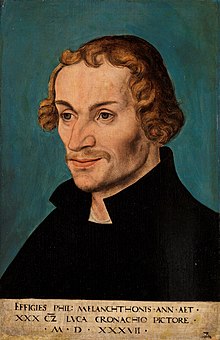Philipp Melanchthon
| Philip Melanchthon | |
|---|---|

Portrait of Philip Melanchthon, 1537, by Lucas Cranach the Elder. Oil on panel
|
|
| Born |
Philipp Schwartzerdt 16 February 1497 Bretten, near Karlsruhe |
| Died | 19 April 1560 (aged 63) Wittenberg |
| Residence | Germany |
| Alma mater |
University of Heidelberg University of Tübingen |
| Occupation | Theologian, professor |
| Years active | 16th century |
| Theological work | |
| Era | Reformation |
| Language | German |
| Tradition or movement | Lutheranism |
| Signature | |
Philip Melanchthon (/məˈlæŋkθən/; Latin: Philippus Melanchthon; 16 February 1497 – 19 April 1560), born Philipp Schwartzerdt (German: [ˈʃvaɐ̯ts.eːɐt]), was a German Lutheran reformer, collaborator with Martin Luther, the first systematic theologian of the Protestant Reformation, intellectual leader of the Lutheran Reformation, and an influential designer of educational systems.
He stands next to Luther and Calvin as a reformer, theologian, and molder of Protestantism. Along with Luther, he is the primary founder of Lutheranism, and is often deemed by historians to be its intellectual leader as contrasted with Martin Luther's rather simplistic views. Melanchthon along with Luther denounced what they believed was the exaggerated cult of the saints, asserted justification by faith, and denounced the coercion of the conscience in the sacrament of penance by the Catholic Church, that they believed could not offer certainty of salvation. Both rejected the doctrine of transubstantiation, but not the belief that the body and blood of Christ are present with the elements of bread and wine in the Lord's Supper. The Lutheran view of sacramental union contrasts with the understanding of the Roman Church that the bread and wine cease to be bread and wine at their consecration (retaining the accidents of both). Melanchthon made the distinction between law and gospel the central formula for Lutheran evangelical insight. By the "law", he meant God's requirements both in Old and New Testament; the "gospel" meant the free gift of grace through faith in Jesus Christ.
...
Wikipedia
